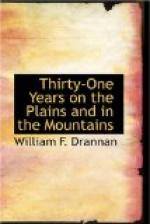In this fight the Apaches showed their blood by standing their ground better than any Indians I have ever seen in a battle. They did not offer to retreat until the soldiers were right up among them, there being some sixty Indians and one hundred soldiers.
This was beyond doubt the wickedest little battle I had ever witnessed, but it did not last long. In the engagement three soldiers were killed and five wounded, and nine horses killed and nine wounded. There were twenty-seven good Indians left on the battle-field, and none of the Indian horses were captured. Those that the Indians did not drive away took fight and ran after them.
The soldiers followed until after dark, but did not find any more dead Indians. We remained in this camp until the Lieutenant came up with his command. He regretted that he did not come on himself ahead of the command, thinking that had he been there the result would have been quite different.
On his arrival he made a detail of eight men to assist in scouting, informing them that they were relieved of all guard duties while serving in that capacity, which is a great relief to a soldier, especially when in an Indian country. I was appointed captain or chief of scouts and George my first assistant The Lieutenant selected what he thought to be the best men he had in his command and they afterwards proved themselves to be just what he had expected. On starting out I did not make any reserve of scouts, but sent four with George and took the other four with me.
The fourth day after starting, about noon, I saw a band of Indians in camp ten miles from the Lieutenant’s quarters. I knew this to be a new camp, as I had been over the same ground only two days previous. The Indians were camped in a valley nearly a mile wide that had not a stick of timber on it, except the few small willows that grew along the little rill that ran through the valley, consequently I could not get close enough to ascertain the number of the Indians until after dark. In the meantime I telegraphed the Lieutenant to hold his men in readiness or to move on at once as he thought best.
As soon as he received my message he mounted two companies of cavalry and pushed on to the place where I had told the messenger to meet me on his return.
While the messenger went to headquarters, in company with one of my scouts I went down near the Indian camp to try to ascertain if possible their number, leaving the other two scouts in charge of the horses. The only way we could get at the number was to count the fires and make an estimate in that way. The Indians seemed to be nervous and much disturbed that night from some cause; continually little squads of them would walk from one fire to another. After we had crawled around something like two hours and made our estimate, we returned to our horses and comrades, and I never was more surprised in my life than when I got back and met Lieut. Jackson there with his command, for I did not think sufficient time had passed for him to come that distance. I sat down and explained the lay of the ground as best I could, nothing being in the way except the little creek that carried the water across the valley, and I told him that about one hundred and fifty yards below the Indian camp the horses would be able to jump it. I also told them that I estimated their number at two hundred.




